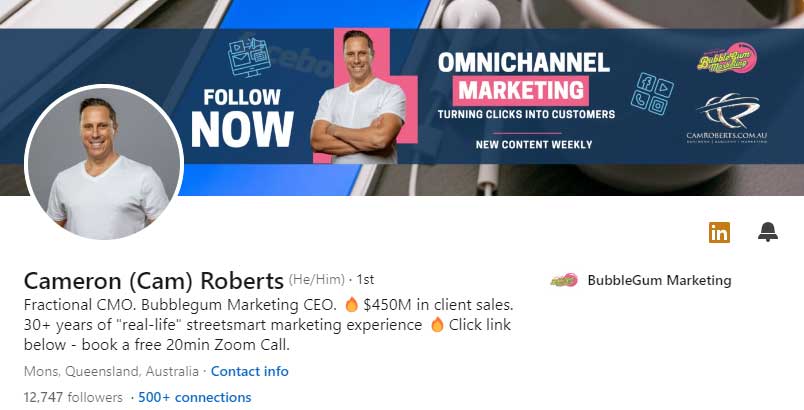What Is B2B Marketing – Its Trends & Strategies
By Cameron Roberts – Founder & CEO of Bubblegum Marketing,
Posted On December 13, 2023
You might be wondering what the term “B2B” means if you have never heard of it before, but fear not, as it’s really easy to understand. Business-to-business is the full form of B2B. It is defined as the field of commerce where a company or business sells goods and services to another company or business, unlike when they are sold to individual consumers.
This blog will serve as a great starting point for clearing up any confusion regarding the world of B2B marketing. We will go through the meaning of B2B marketing and discover the importance of B2B marketing. After that, we are going to explore the world of strategies that provide B2B marketing with an edge over its competitors, disclosing the inside information that makes it work like magic.
We won’t stop there; to provide you with an in-depth knowledge of the market, we will also briefly discuss the different types of B2B markets. We will also talk about the differences between B2B and B2C marketing to make sure there are no misunderstandings. Prepare yourself for a beneficial journey that will reveal the secrets behind business transactions.
Get ready as we explore the trends and strategies that make business-to-business (B2B) marketing so interesting!

What is Marketing?
The process of advertising and selling goods or services to consumers is known as marketing. It includes learning about the preferences and needs of prospective customers, developing worthwhile offerings to meet those needs, and informing the target market about the advantages of those offerings. In its simplest form, marketing is the process of raising consumer awareness, understanding their curiosity, and convincing them to select one good or service over another that is on the market.
It includes a range of tasks like product development to make offerings that satisfy the needs of the market, pricing strategies, distribution, branding, advertising, and market research to understand customer behaviours and preferences. Building and maintaining relationships between companies and their clients is the ultimate goal of marketing, as it fosters client happiness, brand loyalty, and company expansion.
You can also check out the definition of marketing by the father of modern marketing, Philip Kotler, as- “Marketing is a social and managerial process by which individuals and groups obtain what they want and need through creating, offering and exchanging products of value with others.”
What is B2B Marketing?
B2B marketing is like a special kind of marketing where businesses sell their products and services to other businesses and organisations instead of regular people. It’s not like B2C marketing, which is all about selling things to individual customers. B2B marketing content is generally easier to understand and more informative as compared to B2C marketing.
In B2B marketing, businesses make decisions about what goods and services to buy so that it will make them more money. When people normally buy products, they do not think about how much money they will make in return, as they buy them for personal consumption. But for businesses, making sure they get a good return on investment (ROI) is a big deal.
In today’s world, B2B marketers usually sell to groups of people who make decisions together, called buying committees. It can get a bit complicated, but because data sources are more useful and reliable now, B2B marketers are much better at understanding these groups of people and providing them with the right information that matters to them.

Importance Of B2B Marketing
One may question the need or importance of B2B marketing, so to satisfy your query, check out the below-mentioned points.
1. Understanding How People Buy
The main goal of B2B marketing is all about figuring out what makes people want to buy stuff. The trick is to gain their trust and connect with their feelings, and a skilled B2B marketing agency can help in these areas. By using B2B marketing, businesses can research their target audience and customise their offers using accurate information. In particular, for the producers of goods and services, it is crucial to give careful consideration to the research.
2. Extending The Sales Cycle
Extending the sales cycle is one of the outstanding benefits of B2B marketing. Companies can promote their products and services to their clients using a variety of strategies and actions. Since B2B marketing is all about solving problems and being valuable, it provides the buyer with the opportunity to make rational decisions based on thoughtful consideration.
3. Expanded Reach Range
Businesses can simply reach more customers with the help of B2B marketing, which is why it is so important. Businesses can communicate with individuals worldwide by using smart online strategies. They don’t have to worry about limits or boundaries. Online platforms allow businesses to expand their reach globally and engage with a diverse range of customers. This makes it simpler for them to succeed and expand. Profitability and development are made possible by B2B marketing, which functions as a key for unlocking doors for clients worldwide.
4. No-Cost Advertising Methods
Free advertising techniques that go beyond TV and newspapers are very beneficial to B2B marketing. These days, you can connect with people anywhere on the globe for free thanks to the internet. In this era of advancement in technology, being creative and making catchy content is important. When it comes to advertising, social media is the place to have a presence. In order to make sure that your business reaches a large audience in the digital age, B2B marketing is all about using these no-cost methods of getting recognised.
Simple B2B Marketing Process
B2B networking is like forming friendships with other companies. They start by determining which companies would most benefit from their offering. To do this, one must comprehend the needs and issues faced by those businesses. After that, they draft a plan by formulating specific objectives.
The next step is to demonstrate to these companies how they can assist them. They create engaging content, such as articles or videos, that explains how their product or service can help them with their problems. These products are distributed in various places where these companies are present, such as online or at events.
Marketing companies make an effort to contact these companies as soon as they express interest. To find out more about them, they may offer them something of value, like a free guide, or simply ask for their email. Also, they do not ask them to buy anything right away after they get their contact details. Instead, they keep talking to them, invite them to webinars or events, or just send them helpful emails. By doing so, they establish trust and understanding about their product.
After all these, it becomes simple for the buyer to get the product. They provide them with all the information they require and might even make a unique offer. After that, business owners make sure their clients are satisfied when they become their clients. They remain friendly at all times and assist them when they need it.
Throughout this whole process, they keep an eye on what works and what doesn’t. They keep checking the numbers to see if their plan is working well. If something doesn’t work, they change it and try something new. It’s like a cycle – always trying to improve and make more friends with other businesses.

Top B2B Marketing Trends
For businesses looking to stay successful, competitive, and relevant, delving into these trends can be a huge advantage. Check out the popular trends.
1. Artificial Intelligence (AI) Growth
In the world of business-to-business (B2B) marketing, artificial intelligence (AI) is already gaining popularity and it doesn’t seem to be slowing down. More and more businesses are accepting AI at an increasing rate, especially with the variety of tools available. B2Bs can easily automate, customise, and optimise their marketing strategies with the help of these technologies. Artificial intelligence (AI) is like a helpful companion that can help with activities like data organisation and setting up email sequences automatically, avoiding mistakes that humans might make.
While technology is unable to replace the position of your human staff, it helps the marketing efforts run more smoothly. More B2B AI marketing solutions were introduced last year, opening up the technology to businesses of all sizes. With AI, businesses can improve their overall performance and gain valuable information. It’s similar to having a tech-savvy friend who helps to organise and enhance the efficiency of your marketing activities.
2. Effective Use Of Content Marketing
In the business-to-business (B2B) market, content marketing has become important and is growing in popularity. The problem is that it’s becoming more competitive. There is increasing pressure on B2B marketers to produce exceptional content that is memorable and adds value for their target audience. While it’s not simple, things are becoming a little easier thanks to new technological tools like data analytics and generative AI.
These tools help marketers understand their audience better, which makes it easier for the creation of more relatable content. Believe it or not, as of 2023, a massive 91% of B2B marketers are all about content marketing. It is simply meant as a reminder of just how important it is in the B2B industry.
3. Integration Of Chatbot Technology
It’s a popular trend in B2B marketing to use chatbots to convert website visitors into potential customers. The reason chatbots are growing in popularity is that they are affordable and provide a wide range of benefits. They are like helpful digital assistants that improve how customers experience a website. They are available 24/7, so they can respond to inquiries instantly and answer all kinds of questions, whether they are simple or detailed.
Businesses can interact with their audience at any time by using chatbots, which are going to satisfy customers and speed up the answers to their inquiries. With chatbots, businesses can more easily communicate with website visitors and convert them into leads and sales. Think of chatbots as a kind helping hand in B2B marketing. Providing clients with what they need at the right time is the main goal.
4. Collaboration With Influencers
Teaming up with influencers is becoming more and more popular in B2B marketing now, not just something for B2C. In B2B, experts and influential people in the industry collaborate with brands to give a thumbs-up to their products and services. This does not just make the brand look good; it also helps it reach more people in specific markets. With everyone doing more online shopping, social media influencers have a huge role in what people choose to buy.
B2B marketing consultants are catching on to this trend, and last year, 71% of them planned to spend more on influencer marketing. This trend is sticking around this year too. As digital marketing keeps growing, influencers are becoming even more important in shaping how marketing and sales work in the future. It’s like teaming up with popular people to make sure more people know about your business and what you are selling.
5. Taking Advantage Of Social Media’s Power
The use of social media in business-to-business (B2B) marketing makes perfect sense when you consider all of the advantages. Due to its ability to reach a wide and diverse audience, social media has emerged as the preferred platform for businesses looking to develop relationships with consumers. Thanks to the millions of users on social media platforms such as Facebook, Instagram, LinkedIn, and Twitter, businesses can easily reach a wide audience with messages that have immediate impacts on them. Social media provides B2B businesses with an opportunity to speak directly to partners, clients, and other business associates.
It lets them have conversations, get comments, and share things, building up brand awareness, loyalty, and trust. An added benefit of social media platforms is that they provide B2B marketers with a wealth of data and information on how successful their efforts are, allowing them to improve their results. Thus, it makes sense to use social media in the industry of B2B marketing in order to build a connection with a large audience and make your brand stand out.
6. Using Voice Search Optimisation
Due to the increasing popularity of voice-activated devices such as digital assistants and smart speakers, voice search optimisation has become an important part of B2B marketing. Businesses have an opportunity to improve their online visibility and client relationships by taking advantage of this trend, which is changing the way people search for information. To make your online material and website easier to find using voice commands, voice search optimisation is all about making minor adjustments to them. When using voice search, users casually ask detailed questions, as compared to typing in keywords.
They often look for local businesses or services, so making sure your local information is updated helps it show up in voice search results. In addition, the technical functionality of the website, such as its speed, mobile friendliness, and data organisation, matters a lot. Gaining a higher ranking in voice search results is facilitated by performing in these areas. Investing in voice search optimisation is a wise step for businesses operating in the B2B space to remain competitive.
7. Focus On Video Content Creation
Creating video content is becoming a growing trend in business-to-business (B2B) marketing and for an excellent reason. Videos have the power to magically transform difficult information into interesting stories. They were previously known as just part of the work but now they are a major player in the B2B industry. Videos are great because they create real-life experiences that are customised to the preferences of the audience. Businesses can use videos to tell compelling stories that grab viewers’ attention while building strong connections, whether it’s showing a product, offering a virtual tour, or sharing happy customer stories.
The problem is that successful video marketing requires careful execution. A poorly made video can mess up its message and damage a company’s reputation. So, you must concentrate on making high-quality videos, delivering the message clearly, and using creativity in what you display. Investing in video creation is a wise choice for businesses looking to improve their audience engagement in the dynamic world of business-to-business (B2B) marketing.
8. Accurate Targeting Of Audiences On LinkedIn
Although LinkedIn has been around for a while, it is not just another social media platform; it is also important for business-to-business (B2B) marketing. LinkedIn has become valuable to businesses, regardless of whether they are selling to consumers or other businesses, as it is all about business, unlike YouTube. Although there are other purposes for which people use LinkedIn, most users have a business mindset when using the platform. LinkedIn has always been a business platform; however, it recently improved even further with the addition of new capabilities, such as the option to upload videos.
LinkedIn is unique due to the fact that you can connect with a large audience with no effort by posting content there. You can reach many more people with your posts on LinkedIn than on Facebook or Twitter. LinkedIn is therefore the hub for B2B marketers, providing an excellent means of connecting with a large audience and sharing content that gets noticed.

B2B Marketing Strategies
Like any other marketing strategy, the starting point of a successful business-to-business (B2B) marketing strategy is careful planning. B2B marketers use a variety of omnichannel techniques these days to successfully connect with their target audience. Brand ambassadors, mobile marketing, and video marketing have become ever more essential elements of B2B businesses’ strategies in the last few years. Additionally, online B2B marketing has grown in popularity.
In order to reach their target audience, businesses increasingly use a variety of digital marketing strategies in addition to traditional methods of advertising such as email marketing, podcasts, social media marketing, search engine optimisation (SEO), and others.
Mentioned below are some important steps that should be kept in mind while creating a B2B marketing strategy for a successful and full-bodied approach.
1. Clarify Your Brand’s Position – Being clear about your brand’s position is the first step in starting a successful B2B marketing strategy. This means being aware of what sets your goods and services apart from the competition and what makes them attractive to customers. Find out who your target market is, what category your product or service belongs in, and what special advantages it offers. This helps in positioning your brand and provides the basis for an effective marketing strategy in the business world.
2. Get To Know Your Audience – Knowing what your clients need and the difficulties they face in running their businesses is important information for you as a B2B marketer. Determining the goods and services your clients provide, getting to know their customers, understanding the structure of their businesses, and identifying the decision-makers are all necessary to achieve this. For strategies that truly connect with the audience and manage their unique business problems, an in-depth knowledge of the market is essential.
3. Plan Your Marketing Mix – The four Ps should be considered while creating your marketing strategy: product, price, place, and promotion. You can also expand it to the seven Ps by adding people, processes, and physical evidence. For marketers, this mix serves as a checklist that helps them target their ideal audience, maximise earnings, and increase efficiency in marketing. Businesses may use this useful tool to ensure that they are taking full advantage of their strategy and covering all the bases in a competitive market.
4. Introduce New Products – Once you understand what your audience needs, introducing new products is a terrific way to connect with them. A carefully planned go-to-market strategy is important, which includes the steps for this part of your marketing plan. Making sure you plan well and think through your strategies in advance makes it much more likely that your product launch will be a success. With this strategy, you can get the most out of your new products, creating a strong link with your customers and bringing success to the market.
5. Evaluate the Outcomes – To see how well your marketing strategy is working, keep an eye on growth metrics such as how many people you are reaching and the sales you are making. Consider metrics and key performance indicators (KPIs) that match your brand’s goals to figure out if your strategy is a success. Using SEO can also help a lot in reaching people who are actively looking for new products and digital content. You can stay on track with your goals and make necessary adjustments to your strategy in consideration of changes in the market by regularly checking how things are going.
Types Of B2B Markets
There are four types of B2B markets, which are mentioned below:
1. Producers: In the business-to-business (B2B) market, producers purchase goods from other businesses in order to generate finished goods. Some sell these products to other businesses, while others sell directly to consumers. For example:- McDonald’s buys its potatoes and beef from another business and uses them to make burgers that are sold to consumers. This shows how producers play a key role in connecting different businesses to bring finished products to the market.
2. Resellers: Businesses that sell products without making huge changes are known as resellers in the B2B market. Retailers (like Target and Walmart) as well as brokers and wholesalers are included in this group. Businesses can increase sales and expand their consumer base by collaborating with powerful resellers. Producers can strategically use existing channels of distribution to get the products they produce in front of more consumers.
3. Institutions: In the B2B world, institutions are places that are non-profit organisations such as churches, hospitals, charities, private colleges, and civic clubs. They buy lots of different things, trying to save money to do more good in the community. So, if a business wants to work with these institutions, it’s important to get what they need and offer things that help them help the community while keeping costs low. Understanding their goals and needs is key to being a helpful partner.
4. Governments: When it comes to purchasing goods like technology and construction services, governments are the biggest consumers in the world. State, local, and foreign governments are included in this. Businesses of all kinds, including small businesses, women-owned businesses, and disabled veterans, have a lot of opportunities in the business-to-government (B2G) market. Securing contracts with the government can be profitable, but there are strict rules and regulations to follow. Businesses have to proceed carefully through this complex procedure.
Differences Between B2B And B2C Marketing
| ATTRIBUTE | B2B Marketing | B2C Marketing |
| Audience Type | The audience targeted in B2B marketing is a group of potential customers. | The audience targeted in B2C marketing is a large number of individual customers. |
| Customer Relationships | In B2B marketing, the full focus is on creating personal relationships with the customer. | In B2C marketing, the transactions play a more significant role. |
| Sales Funnel | Because there are more decision-makers involved who can influence the final purchase decision, B2B marketing and sales funnels are much longer. | Sales funnels for B2C are not that much longer. |
| Branding | Positioning is the primary focus of B2B marketing’s branding strategy. | The message is more commonly used in B2C marketing. |
| Buying Decision | Decision-makers in B2B marketing consider the viewpoint of the business before making a purchase. | Each customer makes their own buying decisions when it comes to B2C marketing. |
| Time of Conversion | B2B marketers experience a longer sales cycle and slower conversion rates as a result of spending more time on research and team discussion. | Customers in B2C marketing are more likely to make impulse decisions to buy and typically go through a quicker sales cycle. |
| (ROI) Return On Investment | In B2B marketing, clients are interested in discovering how the product can help the business or increase return on investment (ROI). | Customers in B2C marketing are more interested in how the product they have purchased will improve their lives than ROI. |

B2B Marketing Best Practices
1. Understanding the Audience
A thorough understanding of the target market is essential for B2B marketing campaigns to be successful. First, you should describe the total addressable market (TAM) and ideal client profile. It explores the shades defining the needs, preferences, and behaviours of the audience in great detail, going beyond a causal understanding. This calls for a careful examination of their problems, taking into account not just the obvious difficulties but also the more pervasive barriers and intricacies unique to their sector. Understanding these pain points enables the alignment of marketing strategies to position products or services as compelling solutions.
2. Interact Like a Human
In B2B marketing, it’s important to be human. Keep in mind that you are not just talking to a company; you are connecting with real people who have emotions and goals. Instead of just focusing on the business side, get to know the individuals within the organisations you are reaching out to. Make your marketing messages relatable and avoid sounding too robotic. Even though business decisions are usually logical, keeping a human touch in your tone and content helps build a better connection with the people you are interacting with.
3. Create A Unique Brand Image
In B2B marketing, creating a unique brand image is essential. Choose how you want your business to be seen, including its values, voice, and visuals, and then stick to that personality while creating your brand. Customers appreciate transparent and consistent brands, so standing out in the B2B market with a strong brand is beneficial. Using email signatures to share your brand promotions is a smart B2B marketing strategy that will enhance identity and awareness.
4. Balance Precision And Volume In Targeting
You must find the right balance between being precise and reaching a lot of people when doing business-to-business (B2B) marketing. Multiple stakeholders can have an impact on a B2B purchase, so keep that in mind instead of concentrating only on one decision-maker. It is essential to deal with every individual who could potentially influence the final result. B2B buying can be complex, with people changing roles and responsibilities. For this reason, having a well-known brand can be extremely beneficial. It enables you to use smart technologies to interact with a more significant audience while being unique.
5. Don’t Miss SEO and SEM
Using SEO and SEM tactics is important for building a strong online presence and connecting with the right people in the B2B marketing space. SEO is the cornerstone; it is a comprehensive strategy aimed at improving website visibility and generating organic traffic. The process includes conducting thorough keyword research, optimising the website on-page, producing content, and making technical adjustments to ensure SEO compliance. Businesses can improve brand visibility and draw in organic traffic by optimising content with pertinent keywords and high-quality, educational content. This will help them move up the search engine rankings.
6. Pay Attention To Handle Customer Issues
Handling complaints from customers is an essential part of a B2B marketing strategy. Getting to know the people you serve allows you to offer them solutions that improve their day-to-day experiences. Offer them something to solve their ongoing problems, rather than just selling it to them. You will become their go-to supplier for a very long time if you can quickly and accurately respond to their questions. It’s about understanding their needs and being the solution they can rely on.
Conclusion
Understanding the sensitive nature of business customers is essential to succeeding in the dynamic world of business-to-business (B2B) marketing. They want marketing that truly matches their requirements. For your marketing to be successful, it needs to show how your business can enhance theirs. If it’s not achieving this, it’s time to make changes and come up with a new strategy for approaching them.
The key to success is to stay flexible, keep up with the latest trends, and make sure your business strategies are customised to the requirements of these business customers. Building deep connections and succeeding in a highly competitive marketplace may be achieved by B2B marketers by remaining customer-focused and responding to their demands. If you and your team need help related to B2B marketing, Bubblegum Marketing is here to guide you.
WANT TO BE OUR NEXT SUCCESS STORY?
Book a Free Consult
Schedule a 15-minute Free Consultation via Zoom meetings with our Director, Cam Roberts by clicking the button below now:
Recent Articles
- The Concept of Intent-First Funnels for Smarter Conversions
- Automated Funnel Strategies for 2025: What Still Works
- 5 Common Funnel Mistakes That Are Killing Your Conversions
- How AI Is Revolutionising CRM: What Every Marketer Needs to Know
- How Fractional CMO Services from a Marketing Agency Help You Grow Without Full-Time Costs
- How a Fractional CMO Can Transform Your Business Strategy
- How to Find the Perfect Target Audience for Facebook Ads
- How to Scale Facebook Ads Without Increasing Costs
- How E-commerce Brands Can Use Facebook Ads to Boost Sales
- How to Create a High-Converting Facebook Ad Campaign
Request A Quote
Request A Quote for your next Website or Funnel Project below:










































